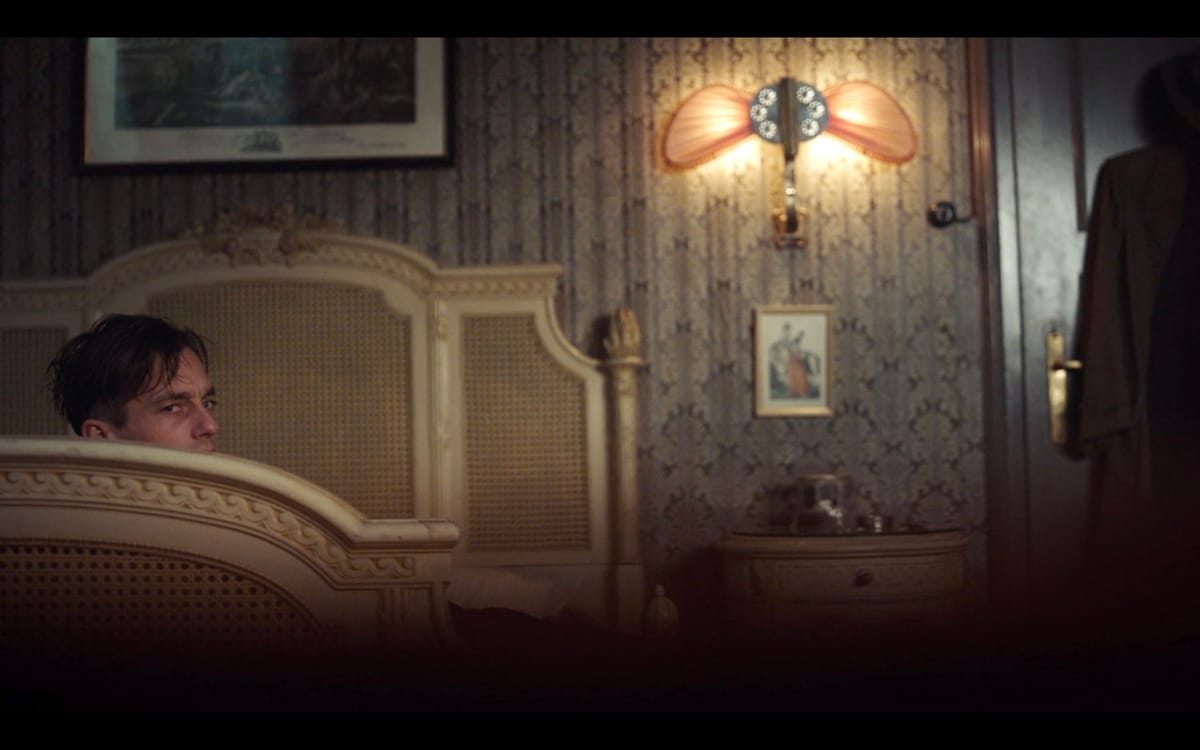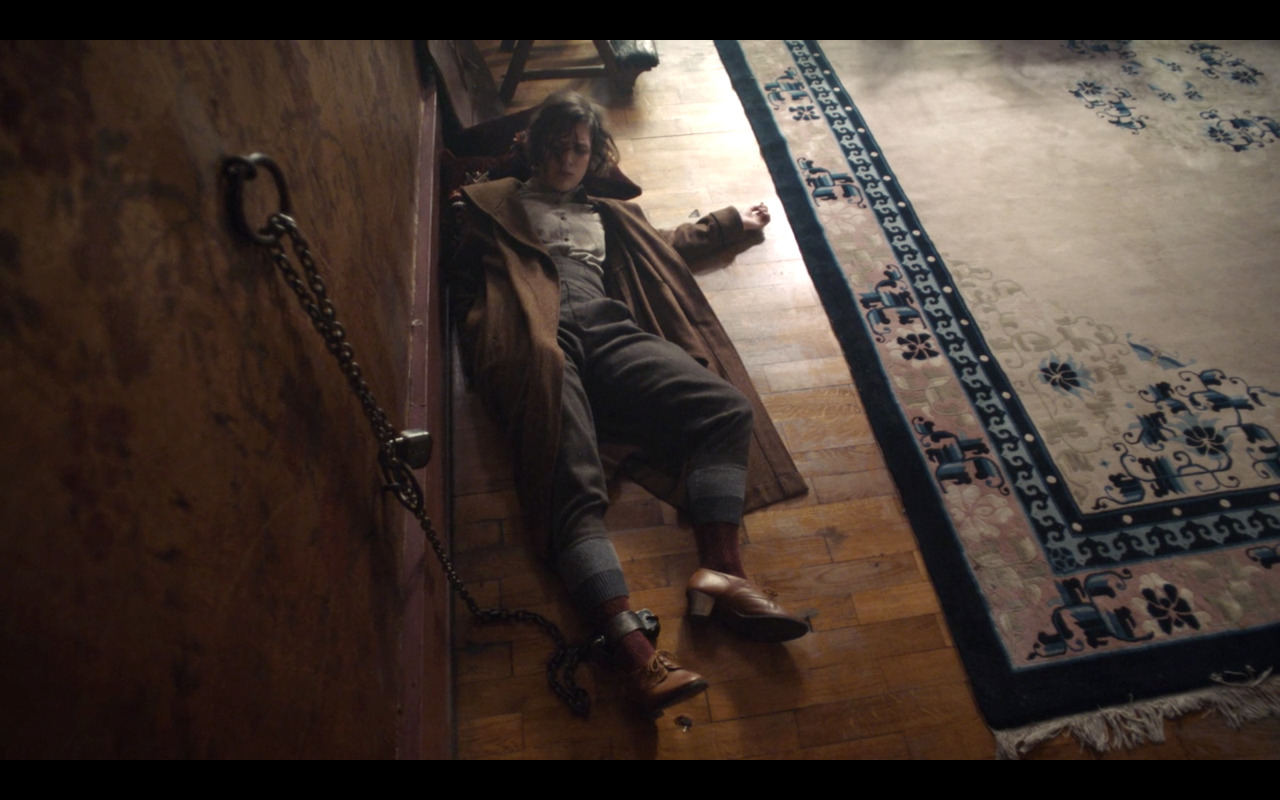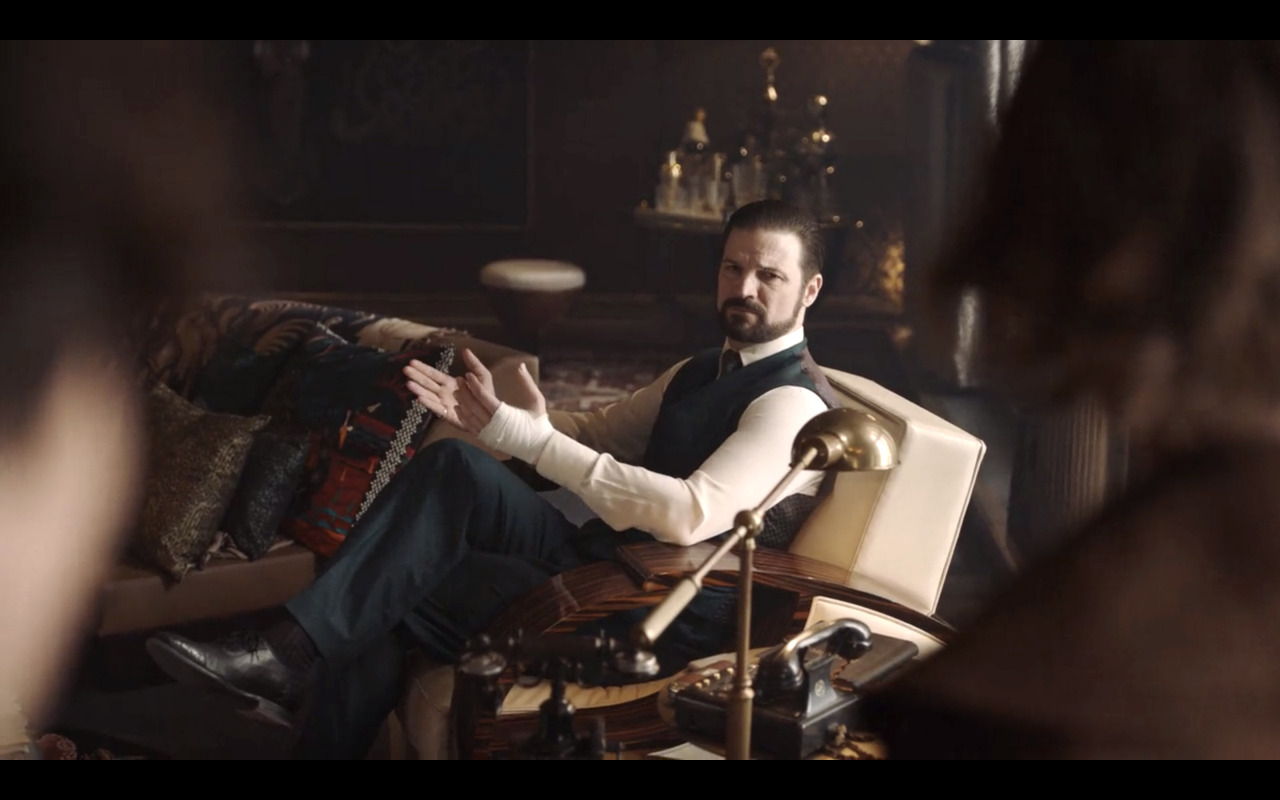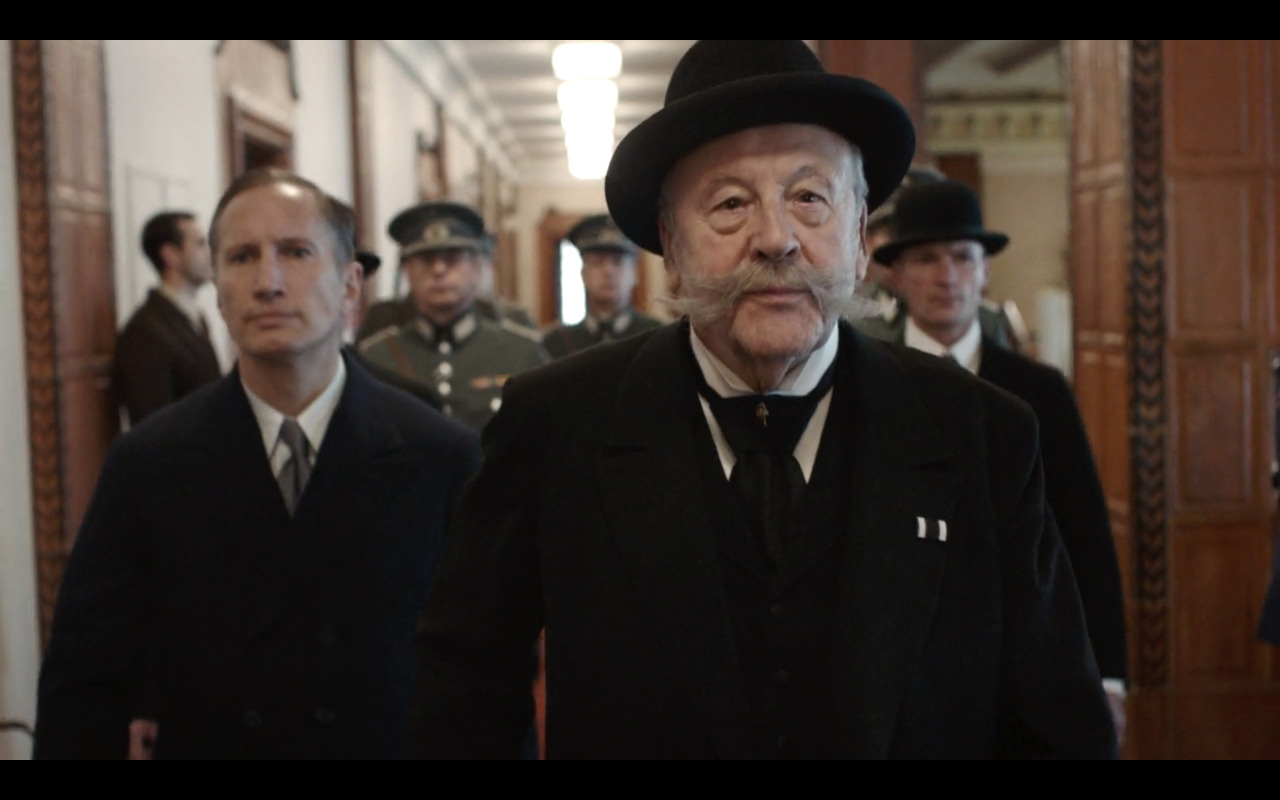Babylon Berlin: "Episode 13" and "Episode 14" (with Tomke Banse)
In which Charlotte saves the day, Gereon also saves the day, and everybody loses all the same. (Plus: More German TV recommendations!)

(For the foreseeable future — aka as long as this quarantine lasts — Emily will be watching the critically acclaimed German drama Babylon Berlin, a neo-noir set in 1929 Germany. The series is available on Netflix in the United States. For every installment, she will be joined by a special guest. Today’s guest is Tomke Banse, an actual German person who can fill us in on the actual history behind this show.)

Emily: I said in the most recent recap that I was deeply disappointed by Charlotte’s kidnapping. It felt like a pointless extension of the story, at a time when it should have been revving up. I wanted the show to not engage in these sorts of plot machinations, because it’s already a show with lots of plot machinations to go around.
Well, consider me completely wrong, then, because I dearly loved when Charlotte discovered who had kidnapped her, and it was — the Armenian! Who still wants the giant train of gold! That seemingly everybody else has forgotten about! Babylon Berlin keeps so many different plates spinning that it’s fun to see how it will distract you from, say, the incredibly complicated political power struggles that defined much of season one until it wants to sock you in the jaw with the memory of a massive train filled with gold that just went missing.
And the plot where Charlotte tries her level best to stay alive after being tossed in the deep freeze is just the B- or C-plot of “Episode 13” and “Episode 14,” two episodes that bring a lot of the season’s action to a head and lead in to some exciting climactic moments. But they also clarify just what’s been going on all season, pulling back the veil to reveal that the Black Reichswehr’s ultimate plot is to take out the Weimer government and reinstall Kaiser Wilhelm, which is apparently something they think will save the day.
The way the series presents all of this information is imaginative and important, because it’s laying out precisely how Gereon will foil the coup when he does. But it also goes one beyond reality and drifts into the realm of outright fantasy, with Wilhelm returning to wave to an adoring throng below. Finally, the governed will not have to actually do any of the governing! Somebody will just tell them what to do!
This is, of course, one of the major themes of the show — how the desire to be told what to do and to conform to what others are doing leads, inch by inch, to something far worse than making a wrong choice in the moment — but the whole sequence is also so audacious, because the series knows that even I, an idiot American, will know that Kaiser Wilhelm did not return to power in 1929. It’s daring to raise this specter, but it works because it proves a point about the show’s central arguments about desire, power, and democracy.
Yet there’s a lot of stuff going on here, so this week, I am joined by Tomke Banse, an actual German person, who is one of my favorite people to chat with on Twitter and someone who can hopefully fill all of us in on some of the real life history behind these events. Tomke: Were there really lots of Germans longing for a return of the Kaiser in 1929? And how accurately does this series capture the German history of the period, more generally?
Tomke: First off: I am not a historian nor, sadly, am I old enough to have experienced the 1920s myself. But I love history almost as much as I love television, so Babylon Berlin is a real treat for me. From today's POV it often looks like the Weimar Republic was a modern state just like the Federal Republic of Germany today — and in some ways it was. But it was brand new, an experiment basically. After WWI, Europe was completely re-designed. New states were created, old states became democracies, and old Monarchs were deposed. Anything was possible! During the November Revolution in 1918, there was a real possibility that Germany would become a communist country.
This new democratic system had a real job to prove itself. Babylon Berlin depicts this struggle beautifully: Democrats, Communists, Nazis, Monarchists and the Military all had different visions of what Germany should be. I know it's hard to imagine today, but when state and economy lose stability, people go looking for alternative ideas at the political fringes or start reminiscing about the good old days!
Operation Prangertag is a fictitious coup, but its a brilliant stand-in. I loved the scene where the incarcerated conspirators go over the plan in two ways: It really transported the viewer into their way of thinking and their motivation.
At the same time, it made me laugh out loud. It's just so ridiculous! "His Majesty the Kaiser will return from exile and will address his beloved people." Does the Kaiser know about this? The conspirators don't mention any correspondence with him. "Under His Majesty's guiding hand, we will become the victorious nation we've always been destined to be." The Kaiser hadn't been guiding anyone for years even before the revolution. In reality, Ludendorff had acted as a military dictator during the later years of the war, with Hindenburg and the Kaiser as his front men.
I don't know if many German people really wanted the Kaiser back, but that's not really what's being planned here anyway. What Seegers, Wolter, and company are planning is the re-introduction of the military dictatorship that led the German Reich into losing the war — although they wouldn't see it that way.
There was this myth, the "Dolchstoßlegende" (the legend of the stab in the back). Ludendorff claimed that Germany had in fact never been defeated on the front but hat only lost the war because the socialists, social democrats and Jews had undermined the war effort. This was completely false, of course, but it led a lot of people to believe that the Versailler Vertrag (the Treaty of Versailles that ended World War I) suppressed the German people and kept it from taking its rightful place as a leading military power in Europe.
What intrigued me most these two episodes was how the show managed to further Charlotte and Gereon's relationship, even with them being apart and so much other stuff going on. Last week, you talked about how Charlotte knows all Gereon’s secrets and how much intimacy that creates. This week, Gereon learns one of Charlotte's biggest secrets. Wolter takes him to the brothel in the Moka Efti searching for Charlotte. He brutally tears open doors and shows Gereon where she moonlights.
And yet, Lotte is locked up so close they literally hear the same music. You wrote, their intimacy is built around information. So true. Not only do these two find out information about each other but Lotte is literally transcribing information for Gereon right now so they can finally find out what's up with that god damn train. So good!

Emily: Gosh, I know, right? The hunt for Charlotte — which forces Gereon and Bruno to work together — is one of my favorite things in these two episodes, both because I love an “enemies who have to work together” plot (so long as I know they’ll be snarling at each other all over again) and because we know how close Gereon and Bruno are to Charlotte, but nobody else does. (Well, maybe the Armenian, but he’d just give a smug little smile about this particular set of ironies.)
But, really, these two episodes are exciting throughout. From Kattelbach (one of my favorite recurring characters in this show) warning Gereon about the forces he’s messing with to the death of the informant, all the way to Gereon and Benda’s near triumph over the forces of Operation Prangertag in the justice system, these episodes really hit all of the beats I love from film noir.
In particular, the moment when Gereon foils the assassination plot — at a performance of The Threepenny Opera the French dignitary does not seem to particularly enjoy (get some culture, my good man) — is straight out of a pulpy detective story where the bad guys get away with it, and the good guys barely survive to fight another day.
Babylon Berlin is boxed in tightly by actual history here, as Prangertag can’t actually succeed or even half-succeed, for fear of disrupting the flow of history that Babylon Berlin occupies (a flow of history that will be very important to the closing episodes of this season). But it also has to find a way to give Gereon a win and keep the world at large from finding out about a massive military coup.
That’s a tough needle to thread! But the show is able to because it exists inside a film noir world, where even if Gereon gets the drop on an assassin and then sees said assassin be shot dead by one of the assassin’s co-conspirators, Gereon still won’t get the assassin’s body to prove that what he’s saying is the truth. Where does that body go? It’s impossible to say, and you kind of have to hand-wave that away. (Sure, somebody could remove the body, but c’mon.) And yet because it works so well with the series’ larger themes, I doubt anyone watching will care.
The whole sequence in the opera house is a constant delight, from Gereon infiltrating the place (when we know just how hard that will be) to Bruno taking his place in the chandelier(!) in the name of carrying out his part in the plan. It’s a great reminder of how so much of what makes this show works stems from how episodic its storytelling is. The full story of Operation Prangertag is carried out in these two episodes, with the setup in “Episode 13” and the payoff in “Episode 14.” That gives the show an irresistible momentum. I simply couldn’t stop watching. (Indeed, by the end of “Episode 14,” I just went ahead and finished the season.)
Tomke, did any other moments in these episodes strike you in particular?
Tomke: The missing body just shows how wide-spread that conspiracy is. They have people all over the opera house and all over the city. And we also see how much influence the conspirators have in the highest of places — Wendt even has access to the President.
And that's actually historically accurate. There were a quite a few WWi-veterans who made political careers in the Weimar Republic and then actively worked to undermine it. The plan of Operation Prangertag involves chief of the ministers' office, Kurt von Schleicher, who was actively involved in setting up the Black Reichswehr and was in charge of furthering its interests within the political system. The Black Reichswehr is everywhere. When Kattelbach saiys "You are messing with the state itself." what he is actually saying is "The military runs this state."

I also love how we get to know the Armenian.
First, Charlotte wakes up in his office or apartment in front of this ridiculous painting of a horse in a gas mask, a reminder of the war in which we already know he took part. (It reminded me so much of Jack Donaghy saying, "Art is paintings of horses, Lemon.") We in the audience know this painting from season one when Gereon spots it in the background of the pornographic film he was chasing and recognized the horse as his brother Anno's. Mysterious. Why does the Armenian have a painting of Anno's horse? Or was Gereon mistaken?
Later we see Lotte in front of two different pictures on the wall. The left shows a large family with several members wearing a fez. (What's the plural of fez?!?) The right picture shows a single boy, maybe 8, also wearing a fez, sitting in a chair by himself. This has a significance that would have been perhaps more readily understandable to the German audience watching the show’s premiere in 2017. In 2016, the year before Babylon Berlin came out, the German parliament marked the 100th anniversary of the killing of the American people by Turkey during World War 1 by officially declaring that killing a genocide. That affronted the Turkish government, and it was a huge thing in the German news.
That provides some of the context you need to understand these episodes. The Armenian seems to be his family's sole survivor of the genocide. Yet here he is, a powerful and wealthy man in Berlin. And at the climax of the whole kidnapping arc, as he threatens little Toni, we learn his first name (Edgar). I am very excited to find out more about this man.
Emily: You know who I want to know about is General Seegers, who just exudes pompous assholery. I love a good villain with a beard, and Seegers has a great beard. In the US version of this show, he’d be played by James Cromwell, and somehow, the show would be made by Ryan Murphy, and… let’s not even think about it.
And yet do I want to know about Seegers? I suppose not. He works almost better as a bogeyman — a villain identifiable more by his look (regal and snooty and bearded) than by what he does. Babylon Berlin generally has really good character development, especially of its main characters. (I’m a little underwhelmed by Greta so far, but she’s the exception.) But when it comes to all the other characters in its massive plot, it’s so good at finding distinctive visual ways to help you tell them apart, with a scar here, a birthmark there, a standard method of dressing over there.
For me, the final moments of “Episode 14” might be the best stuff in these episodes. Gereon and Benda have won. They’ve got Seegers dead to rights. They’ve got documents proving he knew about the importation of the poisonous gas, and Gereon’s long chase after this secret military coup is very nearly at an end, to say nothing of that train car of gold. (I haven’t even mentioned how Gereon and Sveta have a seemingly fated meeting in this episode when he realizes that she and Nikoros are the same person.)
And then the president himself wanders in to say that Seegers is free to go, is coming with him. Just as Katelbach warned, Gereon’s attempts to do things without making them as public as possible are doomed to fail. The state will always protect itself. That is what the state does.
The reason Bruno is a much more memorable villain is because he’s such a thoughtful, cunning one, who seems to have a heart. When the show briefly teases the idea that he might shoot Moritz, we know he won’t, because it’s not yet time for Gereon to truly explode (he’ll do that while trying to escape a haze fueled by his new prescription). But the moment when he draws a bead across Moritz’s face is still chilling because we know that Bruno might be either person deep down — the cuddly would-be grandpa or the villainous and sadistic killer. Bruno, in some ways, is the show’s face of fascism. When the series began, he was one of my favorite characters, because he was so fun and avuncular; now, I see that being drawn in by him was exactly what the show wanted me to feel. It helps put a face to something that can be hard to explain.
Tomke: I don't know. I never really liked Bruno. He was emitting toxic masculinity from the very beginning. Maybe he never won me over because the actor, Peter Kurth, is a household name on German television where he often plays murderers or other villainous characters.
Emily: Those pesky actors who always play villains! I never would have known that.
Speaking of the state, I’m feeling a bit bored by the Greta storyline, which seems to be heading in one inexorable direction — she somehow assists in the murder of Benda, presumably by Fritz’s buddy — but which is also the storyline most tied to the unrest in the Berlin streets depicted in these episodes via KPD meetings and police shootings. (I know just enough about the period to know the KPD were Communists — right??)
Can you tell me a little more about the political movements Greta’s story brushes up against? And I’d also love to hear more from you on where Germany’s TV industry is right now. I feel like it’s where Denmark’s was about 15 years ago, and I’d love some more recommendations beyond this and Dark (the only two I’ve watched).

Tomke: Oh Greta. When she was first introduced, you called her a Oh-Honey-character. And that she is. She is the antithesis to Charlotte. In German we call it "die Unschuld vom Lande" (the innocence from the countryside).
Charlotte knows her from the “Kinderlandverschickung”, a program that sent underprivileged children from the cities on holidays in the countryside. So presumably Charlotte went on holidays near where Greta grew up, on the Darß peninsula. (Incidentally, my parents go on holidays there almost every year, it's idyllic.) She gets pregnant by a guy whom she follows into the big city. He ditches her, and she's on her own.
In many other shows Charlotte and Greta would have been the only two stand-ins for women of that era. But here we have such a wonderful variety of female characters that she is just one of many depictions of what it meant to be a woman at the time. Other women are political, like Dr. Völcker; others try to climb the social ladder like Charlotte; others just resign themselves to their lives like Emma Wolter.
About the communists: The KPD was a far-left communist party that basically came out of the November Revolution in 1918. The so called Spartakusbund around Rosa Luxemburg and Karl Liebknecht had led the revolution and tried to implement a socialist republic. Like the far-right they had para-military groups. The 1920s were littered with political murders from both fringes of the political spectrum, but the Nazis were better organised than the left and — more importantly — very well connected, especially with the conservative movements. In contrast, the left was split: The KPD strongly opposed the social democratic party, SPD, and even within the KPD, there were different strands of communism and socialism.
When it comes to German TV of the moment, I can only speak from the audience's perspective. But it's doubtlessly an exciting time for the industry. Germany is a very small market for television shows, and a lot of scripted shows are imported and dubbed. I myself hadn’t watched German television since I understood enough English to watch the third season of How I Met Your Mother!
But more recently, there have been new opportunities for German TV productions with streaming opening international markets. Babylon Berlin apparently is the most expensive non-English-language TV show of all times. A show like this could never have been financed and distributed without streaming.
But there is a hand full of other fantastic other German shows you should check out, too. There is of course Netflix’s Dark which is too weird for me to describe. Then there is Deutschland 83, a show about a young soldier in the DDR (East Germany) who is forced to spy for the secret police.
A show I haven’t watched yet, but which is on the top of my list is Unorthodox, a limited series about a young woman who flees her orthodox Hassidic community in New York and flees to Berlin in search of her mother. And then there is always Der Tatortreiniger, a lovely show about a crime scene cleaner who meets all kind of people while, well, cleaning crime scenes and always ends up in some kind of ethical or philosophical discussion with them, while being incredibly funny and warm.
Emily: A crime scene cleaner who has philosophical discussions with other people? That sounds made for me.
Tomke, this was such a pleasure. I greatly enjoyed talking to you, and I learned a lot of stuff that made me appreciate this show even more. Do you have anything you’d like to plug?
Tomke: I don’t have anything of my own to pitch — I am a teacher and don’t usually publish things. So I’ll just give you all some homework: Keep watching Babylon Berlin.
Emily: Well, if you insist.
For all the rest of you, we’ll be wrapping up season two on Friday with Kathryn VanArendonk of Vulture, aka the foremost cheerleader of this show in the US. See you then!




